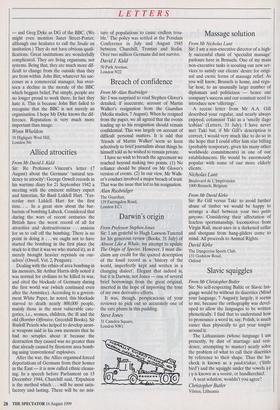Allied atrocities
From Mr David J. Kidd Sir: Re Professor Vincent's letter (7 August) about the Germans' natural ten- dency to atrocity': George Orwell records in his wartime diary for 21 September 1942 a meeting with the eminent military expert and historian, Sir Basil Liddell Hart. 'Yes- terday met Liddell Hart for the first time.... In a great stew about the bar- barism of bombing Lubeck. Considered that during the wars of recent centuries the British have the worst record of all for atrocities and destructiveness . . . anxious for us to call off the bombing. There is no point in doing it . . . we ought not to have started the bombing in the first place (he stuck to it that it was we who started it), as it merely brought heavier reprisals on our- selves' (Orwell, Vol. 2, Penguin).
Dealing with the ethics of area bombing in his memoirs, Sir Arthur Harris drily noted it was normal for civilians to be killed in war, and cited the blockade of Germany during the first world war (which continued even after the Armistice). According to a govern- ment White Paper, he noted, this blockade starved to death nearly 800,000 people, mainly those in the most vulnerable cate- gories, i.e., women, children, the ill and the old (Bomber Offensive, Greenhill Books). Sir Rudolf Peierls who helped to develop atom- ic weapons said in his own memoirs that he had no scruples about it because the destruction they caused was no greater than that already caused by firestorm area bomb- ing using 'conventional' explosives.
After the war, the Allies organised forced deportations of Germans from their homes in the East — it is now called ethnic cleans- ing. In a speech before Parliament on 15 December 1944, Churchill said, 'Expulsion is the method which . . . will be most satis- factory and lasting. There will be no mix- ture of populations to cause endless trou- ble.' The policy was settled at the Potsdam Conference in July and August 1945 between Churchill, Truman and Stalin. Over two million Germans did not survive.
David J. Kidd
50 Park Avenue, London N22


























































 Previous page
Previous page